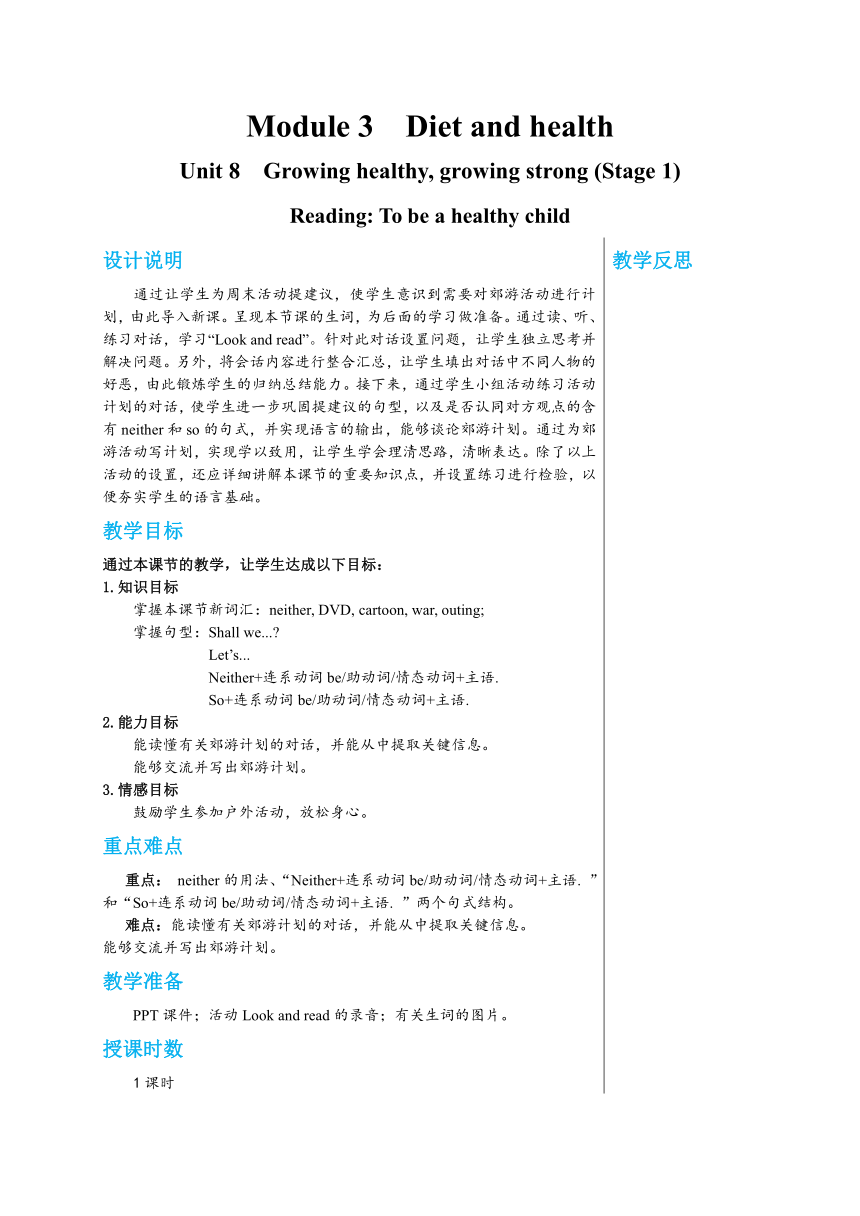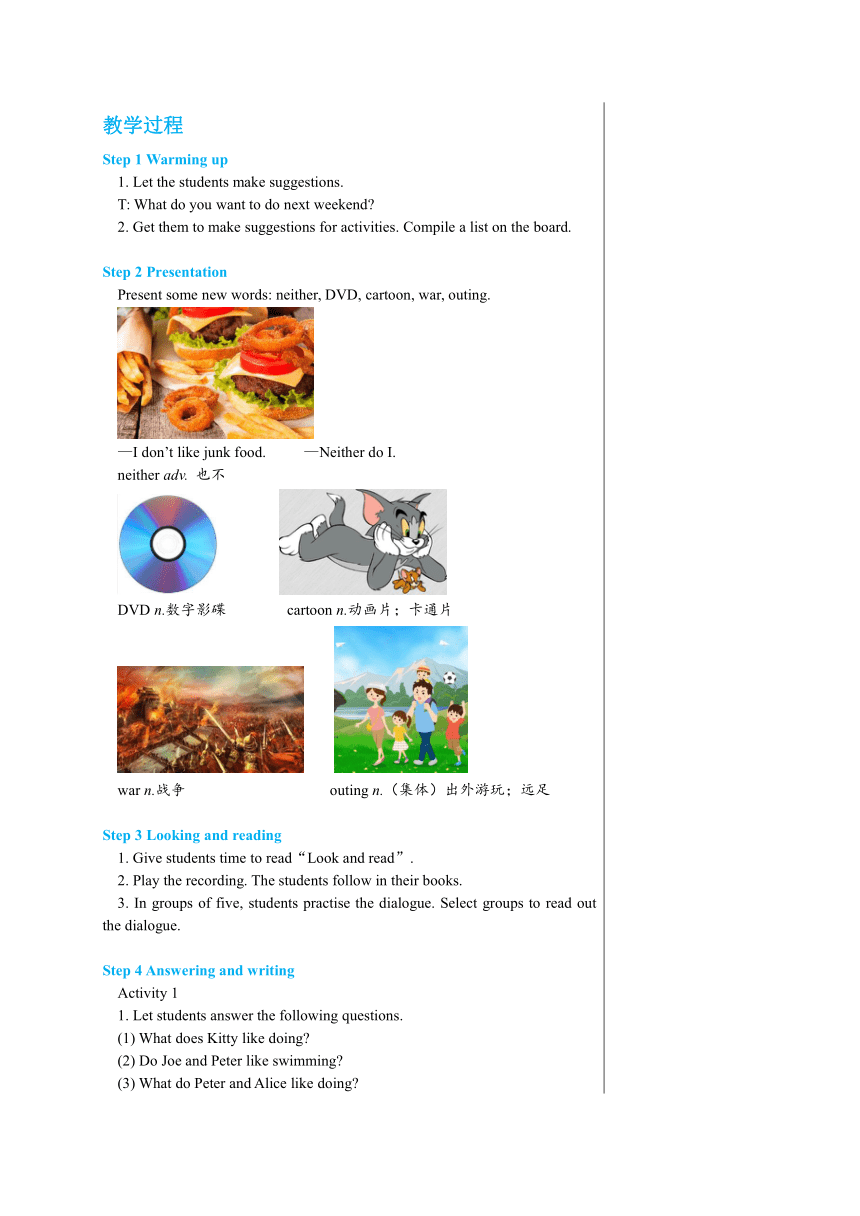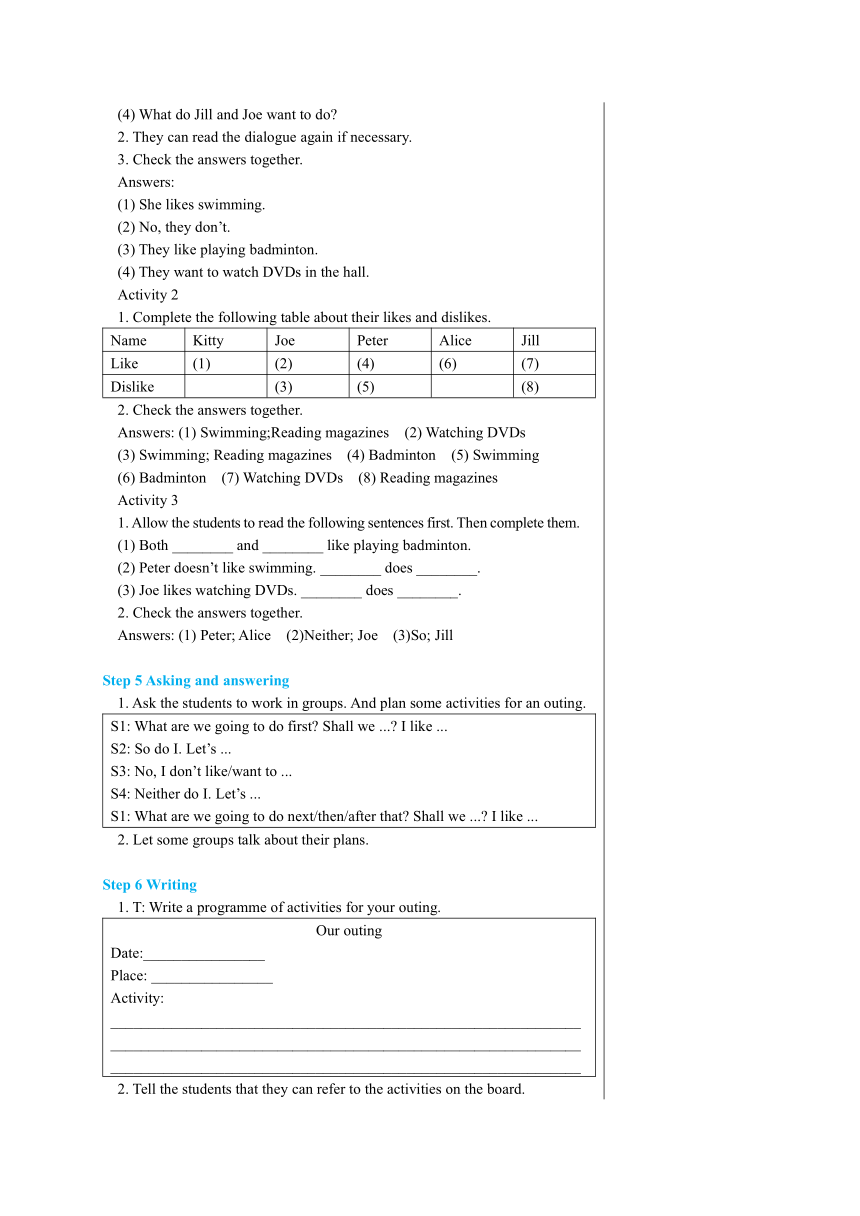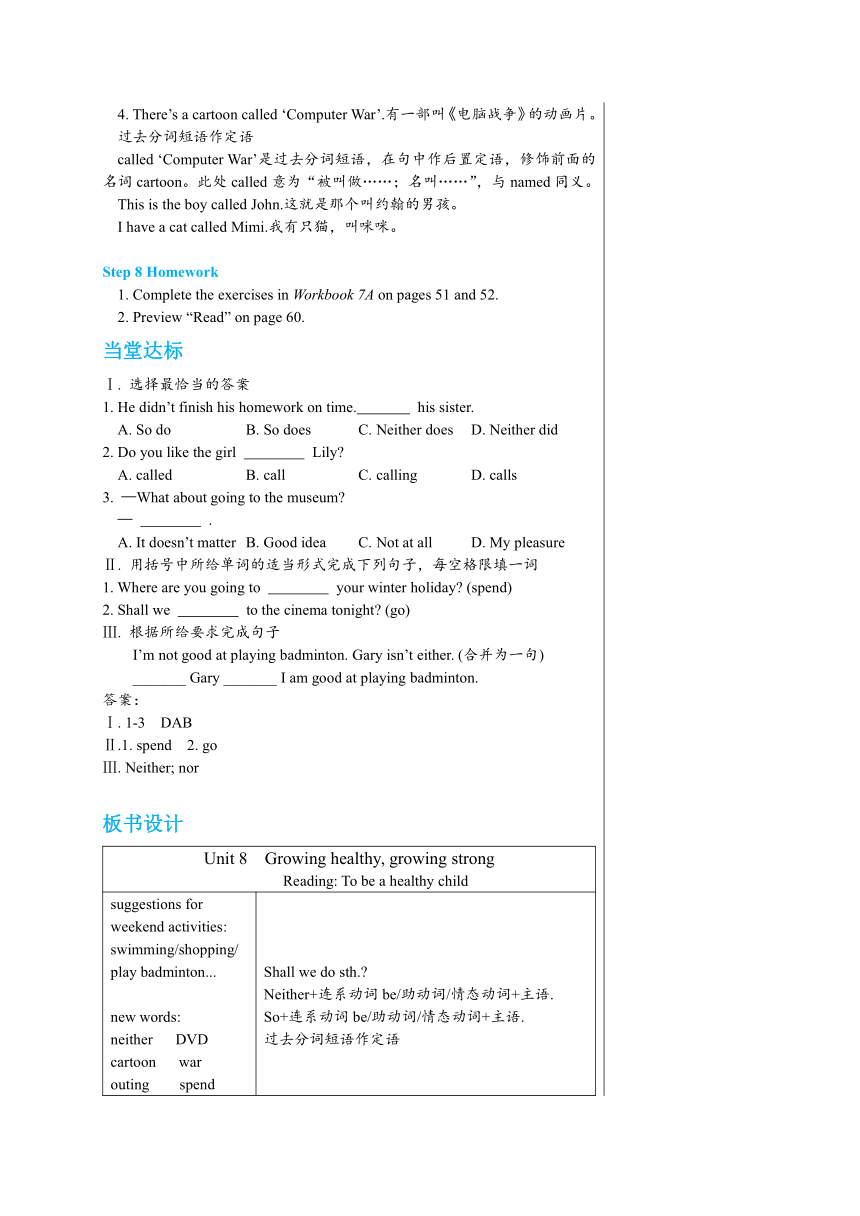Module 3 Unit 8 Growing healthy, growing strong Reading 教案
文档属性
| 名称 | Module 3 Unit 8 Growing healthy, growing strong Reading 教案 |  | |
| 格式 | docx | ||
| 文件大小 | 1.3MB | ||
| 资源类型 | 教案 | ||
| 版本资源 | 牛津上海版(试用本) | ||
| 科目 | 英语 | ||
| 更新时间 | 2021-09-26 21:15:17 | ||
图片预览





文档简介
Module
3
Diet
and
health
Unit
8
Growing
healthy,
growing
strong
(Stage
1)
Reading:
To
be
a
healthy
child
设计说明
通过让学生为周末活动提建议,使学生意识到需要对郊游活动进行计划,由此导入新课。呈现本节课的生词,为后面的学习做准备。通过读、听、练习对话,学习“Look
and
read”。针对此对话设置问题,让学生独立思考并解决问题。另外,将会话内容进行整合汇总,让学生填出对话中不同人物的好恶,由此锻炼学生的归纳总结能力。接下来,通过学生小组活动练习活动计划的对话,使学生进一步巩固提建议的句型,以及是否认同对方观点的含有neither和so的句式,并实现语言的输出,能够谈论郊游计划。通过为郊游活动写计划,实现学以致用,让学生学会理清思路,清晰表达。除了以上活动的设置,还应详细讲解本课节的重要知识点,并设置练习进行检验,以便夯实学生的语言基础。
教学目标
通过本课节的教学,让学生达成以下目标:
1.知识目标
掌握本课节新词汇:neither,
DVD,
cartoon,
war,
outing;
掌握句型:Shall
we...?
Let’s...
Neither+连系动词be/助动词/情态动词+主语.
So+连系动词be/助动词/情态动词+主语.
2.能力目标
能读懂有关郊游计划的对话,并能从中提取关键信息。
能够交流并写出郊游计划。
3.情感目标
鼓励学生参加户外活动,放松身心。
重点难点
重点:
neither的用法、“Neither+连系动词be/助动词/情态动词+主语.
”和“So+连系动词be/助动词/情态动词+主语.
”两个句式结构。
难点:能读懂有关郊游计划的对话,并能从中提取关键信息。
能够交流并写出郊游计划。
教学准备
PPT课件;活动Look
and
read的录音;有关生词的图片。
授课时数
1课时
教学过程
Step
1
Warming
up
1.
Let
the
students
make
suggestions.
T:
What
do
you
want
to
do
next
weekend?
2.
Get
them
to
make
suggestions
for
activities.
Compile
a
list
on
the
board.
Step
2
Presentation
Present
some
new
words:
neither,
DVD,
cartoon,
war,
outing.
—I
don’t
like
junk
food.
—Neither
do
I.
neither
adv.
也不
DVD
n.数字影碟
cartoon
n.动画片;卡通片
war
n.战争
outing
n.(集体)出外游玩;远足
Step
3
Looking
and
reading
1.
Give
students
time
to
read“Look
and
read”.
2.
Play
the
recording.
The
students
follow
in
their
books.
3.
In
groups
of
five,
students
practise
the
dialogue.
Select
groups
to
read
out
the
dialogue.
Step
4
Answering
and
writing
Activity
1
1.
Let
students
answer
the
following
questions.
(1)
What
does
Kitty
like
doing?
(2)
Do
Joe
and
Peter
like
swimming?
(3)
What
do
Peter
and
Alice
like
doing?
(4)
What
do
Jill
and
Joe
want
to
do?
2.
They
can
read
the
dialogue
again
if
necessary.
3.
Check
the
answers
together.
Answers:
(1)
She
likes
swimming.
(2)
No,
they
don’t.
(3)
They
like
playing
badminton.
(4)
They
want
to
watch
DVDs
in
the
hall.
Activity
2
1.
Complete
the
following
table
about
their
likes
and
dislikes.
NameKittyJoePeterAliceJillLike(1)(2)(4)(6)(7)Dislike(3)(5)(8)
2.
Check
the
answers
together.
Answers:
(1)
Swimming;Reading
magazines (2)
Watching
DVDs
(3)
Swimming;
Reading
magazines (4)
Badminton (5)
Swimming
(6)
Badminton (7)
Watching
DVDs (8)
Reading
magazines
Activity
3
1.
Allow
the
students
to
read
the
following
sentences
first.
Then
complete
them.
(1)
Both
________
and
________
like
playing
badminton.
(2)
Peter
doesn’t
like
swimming.
________
does
________.
(3)
Joe
likes
watching
DVDs.
________
does
________.
2.
Check
the
answers
together.
Answers:
(1)
Peter;
Alice (2)Neither;
Joe (3)So;
Jill
Step
5
Asking
and
answering
1.
Ask
the
students
to
work
in
groups.
And
plan
some
activities
for
an
outing.
S1:
What
are
we
going
to
do
first?
Shall
we
...?
I
like
...
S2:
So
do
I.
Let’s
...
S3:
No,
I
don’t
like/want
to
...
S4:
Neither
do
I.
Let’s
...
S1:
What
are
we
going
to
do
next/then/after
that?
Shall
we
...?
I
like
...
2.
Let
some
groups
talk
about
their
plans.
Step
6
Writing
1.
T:
Write
a
programme
of
activities
for
your
outing.
Our
outing
Date:________________
Place:
________________
Activity:
____________________________________________________________________________________________________________________________
______________________________________________________________
2.
Tell
the
students
that
they
can
refer
to
the
activities
on
the
board.
Step
7
Language
points
1.
Mr
Hu
and
the
students
are
spending
their
weekend
at
Health
Camp.
胡老师和学生们正在健康度假营里过周末。
spend
①〔动词〕度过
Would
you
like
to
spend
the
holiday
with
us?
②〔动词〕花费(时间或金钱)
He
spent
two
hours
cleaning
the
room.他花了两个小时打扫房间。
We
spend
three
hours
on
this
maths
problem.
我们在这道数学题上花了三个小时。
Lucy
spends
five
yuan
on
the
book.露西买这本书花了五元。
2.
Shall
we
go
swimming
in
the
swimming
pool?我们去游泳池游泳好吗?
Shall
we
do
sth.?我们做某事好吗?
常用来向对方提出请求或建议。
Shall
we
buy
some
cards?我们买些卡片好吗?
【拓展】表示提建议的句型还有:
①
Why
not
do
sth.?/Why
don’t
you
do
sth.?你为什么不做某事呢?
Why
don’t
you
go
to
the
park?你为什么不去公园呢?
②
How/What
about
doing
sth.?做某事怎么样?
How/What
about
going
shopping
together?一起去购物怎么样?
③
Let’s
do
sth.!咱们做某事吧!
Let’s
have
a
rest!咱们休息一下吧!
3.
Neither
do
I.我也不喜欢。
(1)
“Neither+连系动词be/助动词/情态动词+主语.
”意为“某人也不是(某种情况)”,表示同意对方的否定陈述。
—John
can’t
swim.约翰不会游泳。
—Neither
can
I.我也不会。
—I
don’t
like
the
book.我不喜欢这本书。
—Neither
do
I.
我也不喜欢。
【拓展】“So+连系动词be/助动词/情态动词+主语.
”意为“某人也是(某种情况)”,表示同意对方的肯定陈述。
—My
brother
likes
eating
fish.我哥哥喜欢吃鱼。
—So
do
I.我也喜欢。
(2)
neither
①〔副词〕也不
常用于倒装句的开头,紧跟在一个否定句后面。
—Lucy
isn’t
from
America.露西并不是来自美国。
—Neither
am
I.
我也不是。
②〔形容词〕两者都不
后跟名词单数
Neither
answer
is
right.两个答案都不对。
③〔代词〕两者都不
Neither
of
them
wants
to
play
basketball.他们两个都不想打篮球。
④〔连词〕常和nor连用,即neither…nor…“……和……都不”,连接两个并列成分。连接两个并列主语时,谓语动词遵循“就近一致”原则。
Neither
John
nor
his
parents
want
to
open
the
window.
约翰和他的父母都不想打开窗户。
4.
There’s
a
cartoon
called
‘Computer
War’.有一部叫《电脑战争》的动画片。
过去分词短语作定语
called
‘Computer
War’是过去分词短语,在句中作后置定语,修饰前面的名词cartoon。此处called意为“被叫做……;名叫……”,与named同义。
This
is
the
boy
called
John.这就是那个叫约翰的男孩。
I
have
a
cat
called
Mimi.我有只猫,叫咪咪。
Step
8
Homework
1.
Complete
the
exercises
in
Workbook
7A
on
pages
51
and
52.
2.
Preview
“Read”
on
page
60.
当堂达标
Ⅰ.
选择最恰当的答案
1.
He
didn’t
finish
his
homework
on
time.
his
sister.
A.
So
do
B.
So
does
C.
Neither
does
D.
Neither
did
2.
Do
you
like
the
girl
Lily?
A.
called
B.
call
C.
calling
D.
calls
3.
—What
about
going
to
the
museum?
—
.
A.
It
doesn’t
matter
B.
Good
idea
C.
Not
at
all
D.
My
pleasure
Ⅱ.
用括号中所给单词的适当形式完成下列句子,每空格限填一词
1.
Where
are
you
going
to
your
winter
holiday?
(spend)
2.
Shall
we
to
the
cinema
tonight?
(go)
Ⅲ.
根据所给要求完成句子
I’m
not
good
at
playing
badminton.
Gary
isn’t
either.
(合并为一句)
_______
Gary
_______
I
am
good
at
playing
badminton.
答案:
Ⅰ.
1-3 DAB
Ⅱ.1.
spend 2.
go
Ⅲ.
Neither;
nor
板书设计
Unit
8
Growing
healthy,
growing
strong
Reading:
To
be
a
healthy
childsuggestions
for
weekend
activities:
swimming/shopping/
play
badminton...
new
words:
neither
DVD
cartoon
war
outing
spend
Shall
we
do
sth.?
Neither+连系动词be/助动词/情态动词+主语.
So+连系动词be/助动词/情态动词+主语.
过去分词短语作定语
教学反思
Module
3
Diet
and
health
Unit
8
Growing
healthy,
growing
strong
(Stage
2)
Reading:
To
be
a
healthy
child
设计说明
通过完成对话的形式,回顾上一节课的重要表达“Neither+连系动词be/助动词/情态动词+主语.”和“So+连系动词be/助动词/情态动词+主语.
”。设置自由交谈的环节,运用“头脑风暴法”让学生思考并谈论保持健康的方法,由此导入新课。结合朗读、听录音等形式,学习课文。另外,给课文挖空,让学生学会捕捉有效信息,正确填写内容。在此基础上,学生已经能对保持健康这一话题有较深入的理解。接下来,让学生两人一组,谈论保持健康的方法,引导学生有效输出。此外,还设置了写作环节,让学生能够介绍保持健康该做和不该做的事情,这既培养了学生的写作能力,又潜移默化地促进了良好习惯的培养。最后,对本节课中出现的重要知识点进行讲解和练习,提高学习效果。
教学目标
通过本课节的教学,让学生达成以下目标:
1.知识目标
学习本课节新词汇:
sheet,
regularly,
at
least;
掌握句型:If
you
want
to
stay
healthy,
you
should
go
to
bed
early
and
get
up
early.
We
should…/
We
should
not…
2.能力目标
能够读懂有关健康生活的短文;能够清晰表达健康生活的方法;能够制作关于如何保持健康生活的海报。
3.情感目标
通过了解健康基本知识和理念,让学生自愿改变不良的生活行为,逐步提高学生健康生活的意识
重点难点
重点:灵活运用if从句,以及We
should.../We
shouldn’t...句式来表达健康生活。
难点:能够读懂有关健康生活的短文;能够清晰表达健康生活的方法;能够制作关于如何保持健康生活的海报。
教学准备
PPT课件;活动Read的录音;有关生词的图片。
授课时数
1课时
教学过程
Step
1
Revision
1.
Let
the
students
complete
the
following
dialogues.
Dialogue
1:
S1:
I
really
enjoy
watching
movies.
S2:
So
.
Dialogue
2:
S1:
I
don’t
like
swimming
in
winter.
S2:
do
I.
It’s
so
cold
in
winter.
Dialogue
3:
S1:
I
usually
eat
healthy
food.
S2:
do
I.
Dialogue
4:
S1:
I
don’t
like
eating
eggs.
S2:
Neither
.
2.
Check
the
answers.
Answers:
do
I;Neither;So;do
I
Step
2
Brainstorm
Ask
the
students
to
brainstorm
the
following
questions
and
let
them
have
a
talk.
(1)
How
do
we
keep
healthy?
(2)
What
do
we
do
to
keep
healthy?
(3)
What
don’t
we
do
to
keep
healthy?
Step
3
Presentation
Present
the
new
words
and
expressions:
sheet,
regularly,
at
least.
sheet
n.
一张(纸)
get
up
at
7
o’clock
every
morning→regularly
adv.有规律地
at
least至少
It
takes
at
least
an
hour
to
get
home
from
work.
下班回家至少得花一个小时。
Step
4
Reading
and
listening
1.
Give
the
students
time
to
read
the
information
sheet
“How
to
be
a
healthy
child”.
2.
Play
the
recording.
The
students
follow
in
their
books.
3.
Select
four
students
to
read
the
four
parts.
Step
5
Reading
and
completing
1.
Let
the
students
read
the
following
sentences
first.
(1)
Health
Camp.
In
the
camp,
you
will
learn
how
to
stay
(2) .If
you
want
to
stay
healthy,
you
should
go
to
bed
(3)
and
get
up
(4) .If
you
want
to
stay
healthy,
you
should
exercise
(5) .If
you
want
to
stay
healthy,
you
should
eat
a
lot
of
(6) ,
like
fruit
and
vegetables,
and
drink
(7)
eight
glasses
of
water
every
day.If
you
want
to
stay
healthy,
you
should
not
eat
too
much
(8)
or
drink
too
many
(9) .
2.
Let
the
students
complete
the
sentences
according
to
the
passage
by
themselves.
3.
Allow
the
students
to
check
the
answers
in
pairs.
4.
Ask
some
students
to
read
the
complete
sentences
to
elicit
the
answers.
5.
Check
the
answers.
Answers:
(1)Welcome
to (2)
healthy
and
strong (3)
early
(4)
early (5)
regularly (6)
healthy
food (7)
at
least (8)
sweet
food
(9)
soft
drinks
Step
6
Asking
and
answering
1.
Ask
the
students
to
work
in
pairs.
Tell
them
to
talk
about
the
ways
to
keep
healthy
according
to
the
passage.
S1:
What
should
we
do
if
we
want
to
stay
healthy?
S2:
We
should/should
not
…
2.
Walk
around
the
class.
Provide
help
if
necessary.
3.
Let
some
pairs
share
their
dialogues.
Step
7
Writing
1.
In
groups,
students
discuss
how
to
stay
healthy.
Encourage
them
to
list
as
many
suggestions
as
possible.
2.
Let
the
students
design
the
poster
and
complete
the
sentences.
If
we
want
to
stay
healthy,
...
We
should
_____________________________________.
We
should
not
__________________________________.
______________________________________________
______________________________________________
3.
Ask
the
students
to
show
their
posters
in
class
and
choose
the
best
one.
4.
One
possible
version:
If
we
want
to
stay
healthy,
...
We
should
get
up
early
every
day.
We
should
drink
a
lot
of
water.
We
should
also
do
a
lot
of
exercise.
We
should
not
play
too
many
computer
games
because
they
are
bad
for
eyes.
We
should
not
drink
soft
drinks.
Also
we
should
not
eat
too
much
sweet
food
and
junk
food.
Step
8
Language
points
1.
In
the
camp,
you
will
learn
how
to
stay
healthy
and
strong.
在度假营里,你将会学会如何保持健康和强壮。
stay
①〔连系动词〕保持
后接形容词作表语,构成系表结构。
Do
exercise
every
day
to
stay
healthy.每天运动以保持健康。
②〔动词〕暂住;逗留
It’s
dark.
You
can
stay
here
for
the
night.天黑了,你可以在这儿过夜。
③〔动词〕停留;待
You
have
a
cold.
Stay
in
bed
and
take
the
medicine.
你感冒了。卧床休息,吃些药。
2.
…you
should
eat
a
lot
of
healthy
food,
like
fruit
and
vegetables,
and
drink
at
least
eight
glasses
of
water
every
day.……你应该多吃些像水果和蔬菜这样的健康食品,每天至少喝八杯水。
(1)like〔介词〕像,比如
相当于such
as,
常用来列举同类人或事物中的几个例子。
We
have
different
kinds
of
drinks,
like
tea
and
juice.
我们有不同种类的饮料,像茶和果汁。
(2)at
least至少
反义短语:at
most至多。
Read
the
text
at
least
120
words
per
minute.
以每分钟至少120个单词的速度阅读课文。
3.
…you
should
exercise
regularly.……你应该定期锻炼。
regularly〔副词〕有规律地;正常地
Take
the
medicine
regularly
three
times
a
day.一天三次按时服药。
【拓展】regular〔形容词〕有规律的;正常的
4.
…you
should
not
eat
too
much
sweet
food
or
drink
too
many
soft
drinks.……你不应该吃太多甜食和喝过多的软饮料。
辨析:too
much,
too
many与much
too
too
much太多修饰不可数名词;也可修饰动词,作状语too
many太多修饰可数名词复数much
too太修饰形容词或副词
She
doesn’t
have
too
much
free
time.她没有太多空闲时间。
He
has
too
many
books
in
his
room.他的房间里有太多的书。
My
sister
is
much
too
fat.我姐姐太胖了。
【助记】too
much,
too
many与much
too
too
much,
much
too,用法区别看后头;
much后接不可数,too来修饰形或副。
too
many要记住,其后名词必复数。
Step
9
Homework
1.
Complete
the
exercises
in
Workbook
7A
on
page
53.
2.
Preview
“Listening
and
speaking:
Good
habits
or
bad
habits”.
当堂达标
Ⅰ.
翻译下列短语
1.
保持健康
2.
上床睡觉
3.
至少
4.
不很……
Ⅱ.
选择最恰当的答案
1.
Don’t
watch
_________
TV
or
play
_________
computer
games.
A.
too
many;
too
many
B.
too
much;
too
much
C.
too
many;
too
much
D.
too
much;
too
many
2.
Welcome
_________
Shanghai.
A.
for
B.
to
C.
at
D.
in
Ⅲ.
根据所给要求完成句子
1.
drink,
to,
milk,
stay
healthy,
every
day
(连词成句)
___________________________________________________.
2.
We
should
get
up
early.
(对划线部分提问)
should
you
?
答案:Ⅰ.1.
stay/keep
healthy 2.
go
to
bed 3.
at
least 4.
not…very
much
Ⅱ.
1-2 DB
Ⅲ.
1.
Drink
milk
every
day
to
stay
healthy/
To
stay
healthy,
drink
milk
every
day
2.
What;
do
板书设计
Unit
8
Growing
healthy,
growing
strong
Reading:
To
be
a
healthy
childsheet regularly
at
least stay like
too
much,
too
many与much
tooIf
you
want
to
stay
healthy,
you
should
go
to
bed
early
and
get
up
early.
We
should…/
We
should
not…
教学反思
3
Diet
and
health
Unit
8
Growing
healthy,
growing
strong
(Stage
1)
Reading:
To
be
a
healthy
child
设计说明
通过让学生为周末活动提建议,使学生意识到需要对郊游活动进行计划,由此导入新课。呈现本节课的生词,为后面的学习做准备。通过读、听、练习对话,学习“Look
and
read”。针对此对话设置问题,让学生独立思考并解决问题。另外,将会话内容进行整合汇总,让学生填出对话中不同人物的好恶,由此锻炼学生的归纳总结能力。接下来,通过学生小组活动练习活动计划的对话,使学生进一步巩固提建议的句型,以及是否认同对方观点的含有neither和so的句式,并实现语言的输出,能够谈论郊游计划。通过为郊游活动写计划,实现学以致用,让学生学会理清思路,清晰表达。除了以上活动的设置,还应详细讲解本课节的重要知识点,并设置练习进行检验,以便夯实学生的语言基础。
教学目标
通过本课节的教学,让学生达成以下目标:
1.知识目标
掌握本课节新词汇:neither,
DVD,
cartoon,
war,
outing;
掌握句型:Shall
we...?
Let’s...
Neither+连系动词be/助动词/情态动词+主语.
So+连系动词be/助动词/情态动词+主语.
2.能力目标
能读懂有关郊游计划的对话,并能从中提取关键信息。
能够交流并写出郊游计划。
3.情感目标
鼓励学生参加户外活动,放松身心。
重点难点
重点:
neither的用法、“Neither+连系动词be/助动词/情态动词+主语.
”和“So+连系动词be/助动词/情态动词+主语.
”两个句式结构。
难点:能读懂有关郊游计划的对话,并能从中提取关键信息。
能够交流并写出郊游计划。
教学准备
PPT课件;活动Look
and
read的录音;有关生词的图片。
授课时数
1课时
教学过程
Step
1
Warming
up
1.
Let
the
students
make
suggestions.
T:
What
do
you
want
to
do
next
weekend?
2.
Get
them
to
make
suggestions
for
activities.
Compile
a
list
on
the
board.
Step
2
Presentation
Present
some
new
words:
neither,
DVD,
cartoon,
war,
outing.
—I
don’t
like
junk
food.
—Neither
do
I.
neither
adv.
也不
DVD
n.数字影碟
cartoon
n.动画片;卡通片
war
n.战争
outing
n.(集体)出外游玩;远足
Step
3
Looking
and
reading
1.
Give
students
time
to
read“Look
and
read”.
2.
Play
the
recording.
The
students
follow
in
their
books.
3.
In
groups
of
five,
students
practise
the
dialogue.
Select
groups
to
read
out
the
dialogue.
Step
4
Answering
and
writing
Activity
1
1.
Let
students
answer
the
following
questions.
(1)
What
does
Kitty
like
doing?
(2)
Do
Joe
and
Peter
like
swimming?
(3)
What
do
Peter
and
Alice
like
doing?
(4)
What
do
Jill
and
Joe
want
to
do?
2.
They
can
read
the
dialogue
again
if
necessary.
3.
Check
the
answers
together.
Answers:
(1)
She
likes
swimming.
(2)
No,
they
don’t.
(3)
They
like
playing
badminton.
(4)
They
want
to
watch
DVDs
in
the
hall.
Activity
2
1.
Complete
the
following
table
about
their
likes
and
dislikes.
NameKittyJoePeterAliceJillLike(1)(2)(4)(6)(7)Dislike(3)(5)(8)
2.
Check
the
answers
together.
Answers:
(1)
Swimming;Reading
magazines (2)
Watching
DVDs
(3)
Swimming;
Reading
magazines (4)
Badminton (5)
Swimming
(6)
Badminton (7)
Watching
DVDs (8)
Reading
magazines
Activity
3
1.
Allow
the
students
to
read
the
following
sentences
first.
Then
complete
them.
(1)
Both
________
and
________
like
playing
badminton.
(2)
Peter
doesn’t
like
swimming.
________
does
________.
(3)
Joe
likes
watching
DVDs.
________
does
________.
2.
Check
the
answers
together.
Answers:
(1)
Peter;
Alice (2)Neither;
Joe (3)So;
Jill
Step
5
Asking
and
answering
1.
Ask
the
students
to
work
in
groups.
And
plan
some
activities
for
an
outing.
S1:
What
are
we
going
to
do
first?
Shall
we
...?
I
like
...
S2:
So
do
I.
Let’s
...
S3:
No,
I
don’t
like/want
to
...
S4:
Neither
do
I.
Let’s
...
S1:
What
are
we
going
to
do
next/then/after
that?
Shall
we
...?
I
like
...
2.
Let
some
groups
talk
about
their
plans.
Step
6
Writing
1.
T:
Write
a
programme
of
activities
for
your
outing.
Our
outing
Date:________________
Place:
________________
Activity:
____________________________________________________________________________________________________________________________
______________________________________________________________
2.
Tell
the
students
that
they
can
refer
to
the
activities
on
the
board.
Step
7
Language
points
1.
Mr
Hu
and
the
students
are
spending
their
weekend
at
Health
Camp.
胡老师和学生们正在健康度假营里过周末。
spend
①〔动词〕度过
Would
you
like
to
spend
the
holiday
with
us?
②〔动词〕花费(时间或金钱)
He
spent
two
hours
cleaning
the
room.他花了两个小时打扫房间。
We
spend
three
hours
on
this
maths
problem.
我们在这道数学题上花了三个小时。
Lucy
spends
five
yuan
on
the
book.露西买这本书花了五元。
2.
Shall
we
go
swimming
in
the
swimming
pool?我们去游泳池游泳好吗?
Shall
we
do
sth.?我们做某事好吗?
常用来向对方提出请求或建议。
Shall
we
buy
some
cards?我们买些卡片好吗?
【拓展】表示提建议的句型还有:
①
Why
not
do
sth.?/Why
don’t
you
do
sth.?你为什么不做某事呢?
Why
don’t
you
go
to
the
park?你为什么不去公园呢?
②
How/What
about
doing
sth.?做某事怎么样?
How/What
about
going
shopping
together?一起去购物怎么样?
③
Let’s
do
sth.!咱们做某事吧!
Let’s
have
a
rest!咱们休息一下吧!
3.
Neither
do
I.我也不喜欢。
(1)
“Neither+连系动词be/助动词/情态动词+主语.
”意为“某人也不是(某种情况)”,表示同意对方的否定陈述。
—John
can’t
swim.约翰不会游泳。
—Neither
can
I.我也不会。
—I
don’t
like
the
book.我不喜欢这本书。
—Neither
do
I.
我也不喜欢。
【拓展】“So+连系动词be/助动词/情态动词+主语.
”意为“某人也是(某种情况)”,表示同意对方的肯定陈述。
—My
brother
likes
eating
fish.我哥哥喜欢吃鱼。
—So
do
I.我也喜欢。
(2)
neither
①〔副词〕也不
常用于倒装句的开头,紧跟在一个否定句后面。
—Lucy
isn’t
from
America.露西并不是来自美国。
—Neither
am
I.
我也不是。
②〔形容词〕两者都不
后跟名词单数
Neither
answer
is
right.两个答案都不对。
③〔代词〕两者都不
Neither
of
them
wants
to
play
basketball.他们两个都不想打篮球。
④〔连词〕常和nor连用,即neither…nor…“……和……都不”,连接两个并列成分。连接两个并列主语时,谓语动词遵循“就近一致”原则。
Neither
John
nor
his
parents
want
to
open
the
window.
约翰和他的父母都不想打开窗户。
4.
There’s
a
cartoon
called
‘Computer
War’.有一部叫《电脑战争》的动画片。
过去分词短语作定语
called
‘Computer
War’是过去分词短语,在句中作后置定语,修饰前面的名词cartoon。此处called意为“被叫做……;名叫……”,与named同义。
This
is
the
boy
called
John.这就是那个叫约翰的男孩。
I
have
a
cat
called
Mimi.我有只猫,叫咪咪。
Step
8
Homework
1.
Complete
the
exercises
in
Workbook
7A
on
pages
51
and
52.
2.
Preview
“Read”
on
page
60.
当堂达标
Ⅰ.
选择最恰当的答案
1.
He
didn’t
finish
his
homework
on
time.
his
sister.
A.
So
do
B.
So
does
C.
Neither
does
D.
Neither
did
2.
Do
you
like
the
girl
Lily?
A.
called
B.
call
C.
calling
D.
calls
3.
—What
about
going
to
the
museum?
—
.
A.
It
doesn’t
matter
B.
Good
idea
C.
Not
at
all
D.
My
pleasure
Ⅱ.
用括号中所给单词的适当形式完成下列句子,每空格限填一词
1.
Where
are
you
going
to
your
winter
holiday?
(spend)
2.
Shall
we
to
the
cinema
tonight?
(go)
Ⅲ.
根据所给要求完成句子
I’m
not
good
at
playing
badminton.
Gary
isn’t
either.
(合并为一句)
_______
Gary
_______
I
am
good
at
playing
badminton.
答案:
Ⅰ.
1-3 DAB
Ⅱ.1.
spend 2.
go
Ⅲ.
Neither;
nor
板书设计
Unit
8
Growing
healthy,
growing
strong
Reading:
To
be
a
healthy
childsuggestions
for
weekend
activities:
swimming/shopping/
play
badminton...
new
words:
neither
DVD
cartoon
war
outing
spend
Shall
we
do
sth.?
Neither+连系动词be/助动词/情态动词+主语.
So+连系动词be/助动词/情态动词+主语.
过去分词短语作定语
教学反思
Module
3
Diet
and
health
Unit
8
Growing
healthy,
growing
strong
(Stage
2)
Reading:
To
be
a
healthy
child
设计说明
通过完成对话的形式,回顾上一节课的重要表达“Neither+连系动词be/助动词/情态动词+主语.”和“So+连系动词be/助动词/情态动词+主语.
”。设置自由交谈的环节,运用“头脑风暴法”让学生思考并谈论保持健康的方法,由此导入新课。结合朗读、听录音等形式,学习课文。另外,给课文挖空,让学生学会捕捉有效信息,正确填写内容。在此基础上,学生已经能对保持健康这一话题有较深入的理解。接下来,让学生两人一组,谈论保持健康的方法,引导学生有效输出。此外,还设置了写作环节,让学生能够介绍保持健康该做和不该做的事情,这既培养了学生的写作能力,又潜移默化地促进了良好习惯的培养。最后,对本节课中出现的重要知识点进行讲解和练习,提高学习效果。
教学目标
通过本课节的教学,让学生达成以下目标:
1.知识目标
学习本课节新词汇:
sheet,
regularly,
at
least;
掌握句型:If
you
want
to
stay
healthy,
you
should
go
to
bed
early
and
get
up
early.
We
should…/
We
should
not…
2.能力目标
能够读懂有关健康生活的短文;能够清晰表达健康生活的方法;能够制作关于如何保持健康生活的海报。
3.情感目标
通过了解健康基本知识和理念,让学生自愿改变不良的生活行为,逐步提高学生健康生活的意识
重点难点
重点:灵活运用if从句,以及We
should.../We
shouldn’t...句式来表达健康生活。
难点:能够读懂有关健康生活的短文;能够清晰表达健康生活的方法;能够制作关于如何保持健康生活的海报。
教学准备
PPT课件;活动Read的录音;有关生词的图片。
授课时数
1课时
教学过程
Step
1
Revision
1.
Let
the
students
complete
the
following
dialogues.
Dialogue
1:
S1:
I
really
enjoy
watching
movies.
S2:
So
.
Dialogue
2:
S1:
I
don’t
like
swimming
in
winter.
S2:
do
I.
It’s
so
cold
in
winter.
Dialogue
3:
S1:
I
usually
eat
healthy
food.
S2:
do
I.
Dialogue
4:
S1:
I
don’t
like
eating
eggs.
S2:
Neither
.
2.
Check
the
answers.
Answers:
do
I;Neither;So;do
I
Step
2
Brainstorm
Ask
the
students
to
brainstorm
the
following
questions
and
let
them
have
a
talk.
(1)
How
do
we
keep
healthy?
(2)
What
do
we
do
to
keep
healthy?
(3)
What
don’t
we
do
to
keep
healthy?
Step
3
Presentation
Present
the
new
words
and
expressions:
sheet,
regularly,
at
least.
sheet
n.
一张(纸)
get
up
at
7
o’clock
every
morning→regularly
adv.有规律地
at
least至少
It
takes
at
least
an
hour
to
get
home
from
work.
下班回家至少得花一个小时。
Step
4
Reading
and
listening
1.
Give
the
students
time
to
read
the
information
sheet
“How
to
be
a
healthy
child”.
2.
Play
the
recording.
The
students
follow
in
their
books.
3.
Select
four
students
to
read
the
four
parts.
Step
5
Reading
and
completing
1.
Let
the
students
read
the
following
sentences
first.
(1)
Health
Camp.
In
the
camp,
you
will
learn
how
to
stay
(2) .If
you
want
to
stay
healthy,
you
should
go
to
bed
(3)
and
get
up
(4) .If
you
want
to
stay
healthy,
you
should
exercise
(5) .If
you
want
to
stay
healthy,
you
should
eat
a
lot
of
(6) ,
like
fruit
and
vegetables,
and
drink
(7)
eight
glasses
of
water
every
day.If
you
want
to
stay
healthy,
you
should
not
eat
too
much
(8)
or
drink
too
many
(9) .
2.
Let
the
students
complete
the
sentences
according
to
the
passage
by
themselves.
3.
Allow
the
students
to
check
the
answers
in
pairs.
4.
Ask
some
students
to
read
the
complete
sentences
to
elicit
the
answers.
5.
Check
the
answers.
Answers:
(1)Welcome
to (2)
healthy
and
strong (3)
early
(4)
early (5)
regularly (6)
healthy
food (7)
at
least (8)
sweet
food
(9)
soft
drinks
Step
6
Asking
and
answering
1.
Ask
the
students
to
work
in
pairs.
Tell
them
to
talk
about
the
ways
to
keep
healthy
according
to
the
passage.
S1:
What
should
we
do
if
we
want
to
stay
healthy?
S2:
We
should/should
not
…
2.
Walk
around
the
class.
Provide
help
if
necessary.
3.
Let
some
pairs
share
their
dialogues.
Step
7
Writing
1.
In
groups,
students
discuss
how
to
stay
healthy.
Encourage
them
to
list
as
many
suggestions
as
possible.
2.
Let
the
students
design
the
poster
and
complete
the
sentences.
If
we
want
to
stay
healthy,
...
We
should
_____________________________________.
We
should
not
__________________________________.
______________________________________________
______________________________________________
3.
Ask
the
students
to
show
their
posters
in
class
and
choose
the
best
one.
4.
One
possible
version:
If
we
want
to
stay
healthy,
...
We
should
get
up
early
every
day.
We
should
drink
a
lot
of
water.
We
should
also
do
a
lot
of
exercise.
We
should
not
play
too
many
computer
games
because
they
are
bad
for
eyes.
We
should
not
drink
soft
drinks.
Also
we
should
not
eat
too
much
sweet
food
and
junk
food.
Step
8
Language
points
1.
In
the
camp,
you
will
learn
how
to
stay
healthy
and
strong.
在度假营里,你将会学会如何保持健康和强壮。
stay
①〔连系动词〕保持
后接形容词作表语,构成系表结构。
Do
exercise
every
day
to
stay
healthy.每天运动以保持健康。
②〔动词〕暂住;逗留
It’s
dark.
You
can
stay
here
for
the
night.天黑了,你可以在这儿过夜。
③〔动词〕停留;待
You
have
a
cold.
Stay
in
bed
and
take
the
medicine.
你感冒了。卧床休息,吃些药。
2.
…you
should
eat
a
lot
of
healthy
food,
like
fruit
and
vegetables,
and
drink
at
least
eight
glasses
of
water
every
day.……你应该多吃些像水果和蔬菜这样的健康食品,每天至少喝八杯水。
(1)like〔介词〕像,比如
相当于such
as,
常用来列举同类人或事物中的几个例子。
We
have
different
kinds
of
drinks,
like
tea
and
juice.
我们有不同种类的饮料,像茶和果汁。
(2)at
least至少
反义短语:at
most至多。
Read
the
text
at
least
120
words
per
minute.
以每分钟至少120个单词的速度阅读课文。
3.
…you
should
exercise
regularly.……你应该定期锻炼。
regularly〔副词〕有规律地;正常地
Take
the
medicine
regularly
three
times
a
day.一天三次按时服药。
【拓展】regular〔形容词〕有规律的;正常的
4.
…you
should
not
eat
too
much
sweet
food
or
drink
too
many
soft
drinks.……你不应该吃太多甜食和喝过多的软饮料。
辨析:too
much,
too
many与much
too
too
much太多修饰不可数名词;也可修饰动词,作状语too
many太多修饰可数名词复数much
too太修饰形容词或副词
She
doesn’t
have
too
much
free
time.她没有太多空闲时间。
He
has
too
many
books
in
his
room.他的房间里有太多的书。
My
sister
is
much
too
fat.我姐姐太胖了。
【助记】too
much,
too
many与much
too
too
much,
much
too,用法区别看后头;
much后接不可数,too来修饰形或副。
too
many要记住,其后名词必复数。
Step
9
Homework
1.
Complete
the
exercises
in
Workbook
7A
on
page
53.
2.
Preview
“Listening
and
speaking:
Good
habits
or
bad
habits”.
当堂达标
Ⅰ.
翻译下列短语
1.
保持健康
2.
上床睡觉
3.
至少
4.
不很……
Ⅱ.
选择最恰当的答案
1.
Don’t
watch
_________
TV
or
play
_________
computer
games.
A.
too
many;
too
many
B.
too
much;
too
much
C.
too
many;
too
much
D.
too
much;
too
many
2.
Welcome
_________
Shanghai.
A.
for
B.
to
C.
at
D.
in
Ⅲ.
根据所给要求完成句子
1.
drink,
to,
milk,
stay
healthy,
every
day
(连词成句)
___________________________________________________.
2.
We
should
get
up
early.
(对划线部分提问)
should
you
?
答案:Ⅰ.1.
stay/keep
healthy 2.
go
to
bed 3.
at
least 4.
not…very
much
Ⅱ.
1-2 DB
Ⅲ.
1.
Drink
milk
every
day
to
stay
healthy/
To
stay
healthy,
drink
milk
every
day
2.
What;
do
板书设计
Unit
8
Growing
healthy,
growing
strong
Reading:
To
be
a
healthy
childsheet regularly
at
least stay like
too
much,
too
many与much
tooIf
you
want
to
stay
healthy,
you
should
go
to
bed
early
and
get
up
early.
We
should…/
We
should
not…
教学反思
同课章节目录
- Module 1 Relationships
- Unit 1 Relationships in beijing
- Unit 2 Our animal friends
- Unit 3 Friends from other countries
- Module 2 My Neighborhood
- Unit 4 Jobs people do
- Unit 5 Choosing a new flat
- Unit 6 Different places
- Unit 7 Signs around us
- Module 3 Diet and health
- Unit 8 Growing healthy,growing
- Unit 9 International Food Festival
- Unit 10 A birthday party
- Unit 11 My food project
